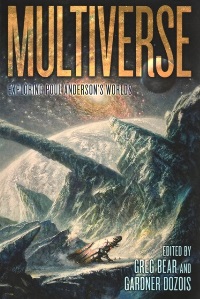 Sometimes, the intentions are better than the end result. Such is the case with Multiverse: Exploring Poul Anderson’s Worlds, a tribute to the late Grand Master edited by Gardner Dozois and Anderson’s son-in-law Greg Bear. This is not to say that Anderson isn’t worthy of the honor. On the contrary, even a cursory look at his body of work suggests how highly he should be regarded. From the swashbuckling Time Patrol and Dominic Flandry stories to the signature fantasy of Three Hearts and Three Lions to his legendary hard science fiction to the mythic grandeur of The Queen of Air and Darkness, Anderson was a creator whose output few matched in terms of quantity or quality, let alone both. Add in his contributions to SF fandom, from filk to convention organizing to nurturing young writers, and it’s clear that he’s a giant of the field.
Sometimes, the intentions are better than the end result. Such is the case with Multiverse: Exploring Poul Anderson’s Worlds, a tribute to the late Grand Master edited by Gardner Dozois and Anderson’s son-in-law Greg Bear. This is not to say that Anderson isn’t worthy of the honor. On the contrary, even a cursory look at his body of work suggests how highly he should be regarded. From the swashbuckling Time Patrol and Dominic Flandry stories to the signature fantasy of Three Hearts and Three Lions to his legendary hard science fiction to the mythic grandeur of The Queen of Air and Darkness, Anderson was a creator whose output few matched in terms of quantity or quality, let alone both. Add in his contributions to SF fandom, from filk to convention organizing to nurturing young writers, and it’s clear that he’s a giant of the field.
It’s almost heartbreaking, then, to see some of the stories, set in his worlds and written by his friends and admirers, try and fail to sing in his range. Oh, the concept is admirable – take a passel of friends, colleagues and followers and have them write a story set in one of Anderson’s innumerable, memorable settings. But the hard truth is that these settings are so memorable perhaps because they are so idiosyncratically Anderson’s, and anyone else attempting to fiddle on those strings is almost bound to come up short.
There are some magnificent exceptions. Nancy Kress riffs on The Queen of Air and Darkness to gutwrenching effect in “Outmoded Things”, a tale of what happens next for the children rescued from the otherworldly aliens who kidnapped them. Terry Brooks also hits a high note with a variant inspired by that same novel, “The Fey of Cloudmoor”. Harry Turtledove writes a bittersweet coda to Three Hearts and Three Lions with “The Man Who Came Late”, in which a look at what comes after the epic adventures paints delicate pictures of heartbreak. And David Brin’s “Latecomers” wrestles with questions of artificial intelligence and humanity while still managing to offer a rousing space battle and, just maybe, aliens.
But there are too many pieces that unfortunately fall flat. The two big takes on the Time Patrol, S.M. Stirling’s “A Slip In Time” and Robert Silverberg’s “Christmas in Gondwanaland”, ask big questions and then handwave them away, settling for underpowered endings. “Three Lillies and Three Leopards (and a Participation Ribbon in Science)” by Tad Williams is a slapsticky attempt at mashing up various bits of Andersonian fantasy, but it spends so much time mugging for the reader and winking at its own self-referential nature that it largely forgets to be a story in its own right. Larry Niven’s Time Patrol story “The Far End” feels dated and weary, while Eric Flint’s “Operation Xibalba” sells its punchline harder than its payoff.
Fortunately, there’s not just fiction to be found here. The remembrances of Anderson – from his wife Karen, daughter Astrid, and friends like Greg Bear and Jerry Pournelle – do as much or more to breathe life into his legend than many of the stories do, and these appreciations provide rich shading and nuance for Anderson’s remarkable career (not to mention his loving partnership with his spouse). This, more than a flat-footed attempt at Flandry, is Anderson’s legacy.
Which leaves the reviewer with an interesting dilemma. There are pieces here which make the book worth picking up, but only the picky reader will dodge some of the disappointing missteps and fumbles. Newcomers to Anderson’s work should probably skip this and go straight for the originals; hard core fans will find much, but not all, to appreciate.
(Subterranean, 2014)
